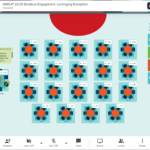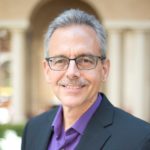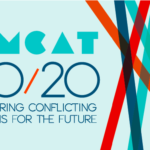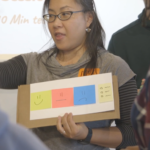WMCAT 20/20 Participant Reflection: Faith and Public Life
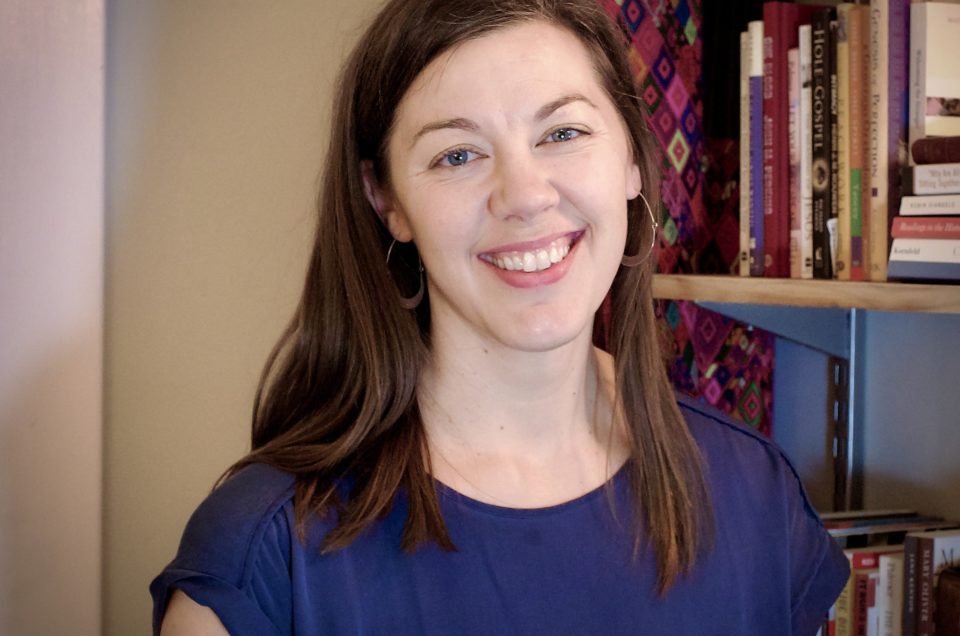
White Christians: It’s Time We Pass the Mic
By Rev. Kate Kooyman
Kate is a participant in the eight-month series, WMCAT 20/20: Exploring Conflicting Visions for the Future, hosted by the West Michigan Center for Arts + Technology (WMCAT). The December 10, 2020 Community Meeting included content contributors, Jasmine Bruce, Elissa Sangalli and Rev. Jim Wallis. This blog is in response to Wallis and Sangalli’s presentation, “Faith and Public Life: The future isn’t centrism, it’s a deeper conversation about our values.” Learn more at wmcat2020.org.
When I think of “the church,” I think of the nurses who are, night after night, holding the hands of those who would otherwise die alone. I think of public school parapros who love their jobs, and who qualify for food stamps because their pay is so low. I think of business owners who haven’t seen a paycheck in months because they’re trying so hard to keep food on their employees’ tables through this pandemic. Faith is, so often, what grounds and inspires and grows the very best of us. It is what inspires us to practice resurrection.
There are a lot of beautiful people in our local churches. Everyday faith, showing up in everyday life, is all over our community. But when Jim Wallis spoke to attendees of the WMCAT 20/20 series last week about “the church,” he wasn’t talking about that. He was talking about the institutional church, the collective weight and power that faith-rooted institutions bring to the table.
There is no community that knows this power better than ours. We see it in most every non-profit, or at least in their chase for dollars from faith-based philanthropy. We see it in the shape of our schools, where Christian affiliation is often a marker of thriving versus the struggle to survive. We see it in hospitals, in politics, in power and in wealth. Faith shapes all of us in Grand Rapids, whether we ascribe to one or not.
Jim Wallis and his organization, Sojourners, have been a force for accountability in Washington DC for decades now, reframing “morality” as less patriarchal-sexual-mores and more moral federal budgets (that prioritize the needs of the poor), moral immigration policy (that is fair, accessible, hospitable), moral defense spending (that murders fewer humans). Wallis has helped Christians like me to understand our role in speaking up for “the common good” for a long time now. Through Sojourners, I came to hear a new kind of calling: to use my political power in ways that honor God, alongside the other things I’d been taught to “steward” well, like my wealth, my time, my talents. And importantly, I came to understand that privilege — whiteness, mainline Christian-ness — is more than something to apologize for. It’s a power I have to reckon with, and allow to become useful to those who have been robbed by it. Soon I learned that if I can get the ear of a Congressman, I must do it. And then, I must give the mic to a DACA recipient to do the talking.
But today’s world does not look like it did when I graduated from Calvin with my subscription to Sojourners. Today, the truly difficult work is not to call the politically powerful back to the values espoused by Jesus in Matthew 25 (now, “the squad” is doing this from within the halls of power), it’s to hold ourselves accountable for what we have created: an unholy marriage between white Evangelicalism and politics, culminating over decades, and coming to its fullness in a contested election, an extinct refugee resettlement system, churches full of smug and maskless people proclaiming a white, armed, American, racist Christ. Today’s task is not to remind those in power to create ethical policies. It’s to remind the church of its own ethics, of its own identity, of its own Christ.
I left Wallis’s keynote feeling the same sickening feeling I’ve felt all year as I see what’s become of the church that shaped me. I felt unmoored, alone, unsure of the future of my faith. The role of faith in the public square depends so much on the dignity of those doing the talking, and in this task the white American church has surely failed.
I’m no longer as confident as I once was about the transformative role of “the church” in policymaking. But, thanks to something Jim Wallis taught me, I think I know what white Christians should do in this moment: let’s pass the mic. Let’s allow those who have the moral authority to be the ones to speak. In this critical moment, let us for once follow someone else’s lead.
ABOUT THE AUTHOR
Rev. Kate Kooyman is a writer, advocate for immigrant rights, and an Eastown resident. She is ordained in the Reformed Church in America.
Follow Kate and her work:
Facebook: @revkatekooyman
Instagram: @revkatekooyman
Twitter: @katekooyman
